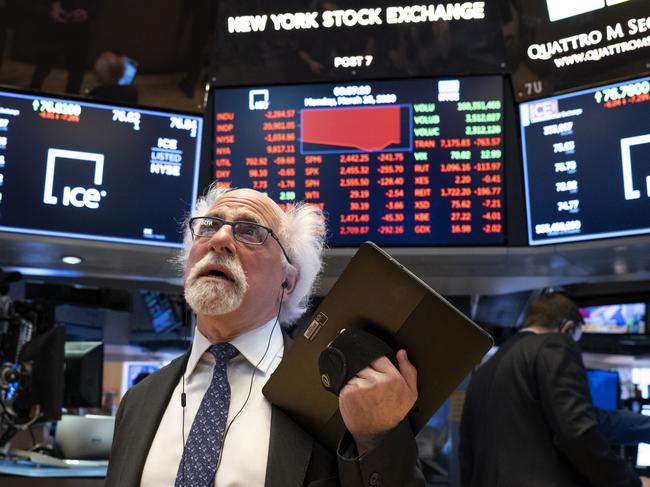Easy explainer: Stocks you need to watch amid coronavirus pandemic
Rollercoaster markets amid the coronavirus crisis can make buying and selling shares a daunting task. Here are the stocks you need to watch and the strategy you need to take in this volatile environment.
Markets
Don't miss out on the headlines from Markets. Followed categories will be added to My News.
Australians racing to trade stocks as market volatility ramps up across the globe have been warned they should not be focused on making a quick buck.
Financial experts told News Corp investors should be focused on long-term strategies as the coronavirus crisis continues.
Technology and healthcare stocks were seen as potential winners with exchange-traded funds (ETFs) offering investment diversity.
Thousands of Australians have also rushed to get a slice of the US market since the coronavirus emerged in early January, with one broker reporting trade volumes have soared almost 150 per cent.

Investsmart’s chief market strategist Evan Lucas said in the current environment, the stocks most likely to generate returns were those that were seeing a “significant increase in use” because of the coronavirus and governments’ responses to the pandemic.
“ZOOM Technologies in the US is up 150 per cent because people now need good video conferencing technology that they can use from home,” Mr Lucas said.
“In Australia, ResMed is starting to show signs of movement, and the reason why that one is so interesting is because it’s a manufacturer or respirators.”
More broadly, Mr Lucas said investors should be watching health product providers, but not health funds which were likely to face drawdowns as members made more claims.
“The other main one to watch is technology stocks, particularly those relating to online content,” he said.

Telecommunications and anything regarded as essential services were likely to perform well, Mr Lucas said, who pointed to Coles and Woolworths. He said there was “no doubt” the supermarkets would have benefited as consumers stockpiled groceries.
Investors should also watch meal delivery services like the ASX-listed Marley Spoon, which had recorded strong growth in its customer base, Mr Lucas said.
He said markets were likely to be volatile but it was possible to tell when they had almost bottomed out when high percentage turnovers reduce to less than one per cent.
He also recommended investors consider ETFs like the NASDAQ 100, which contains 100 top companies listed on the NASDAQ stock exchange.
An ETF is a basket of securities that tracks an index or a sector and is usually done at a low cost.
Robo adviser Six Park’s director of business development Ted Richards said diversification was key.

Mr Richards said purchasing shares in individual companies was “incredibly hard” even for professionals.
He pointed to two ETFs, VGAD (Vanguard) and STW.
“These are two, quick, low-cost ways people can get a diversified portfolio and that’s important because of the volatility we’re seeing day-to-day,” he said.
While conventional wisdom might generally point to buying blue-chip stocks while markets were down, he said there were quite a few that looked risky.
“A lot of companies are being significantly affected and you need to mitigate risks where you can,” he said.

Sydney-based US equities broker Stake, which allows Australians to buy into big American companies like Amazon, Netflix and Tesla via its app, had seen a surge in members since the coronavirus outbreak.
CEO and Founder Matt Leibowitz said almost 13,000 members had joined since January 1, with trading volume also up 148 per cent.
“Our [membership] acquisition rate has also increased specifically through the second half of February and March as the impact of the coronavirus pandemic increased,” Mr Leibowitz said.
Major companies like Tesla, Apple and Microsoft were among the top share purchases on Stake — but there were some surprises.
“What really jumps out are the Inverse and Volatility ETFs, which aren’t regular features on the Top 10 list,” Mr Leibowitz said.
“We’ve seen a thirtyfold increase in the trading in ETFs that allow for investors to make returns when the market falls - inverse ETFs that go up when the US markets fall and the volatility ETFs that are linked to the VIX (volatility) index.”
